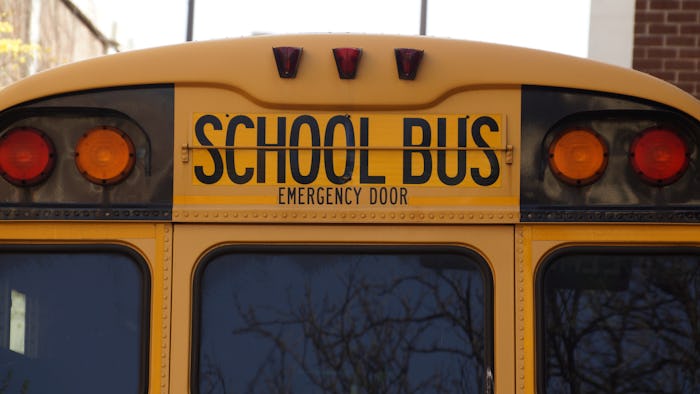Kansas Teacher Allegedly Told Students White People Are Superior, & Parents Are Livid
A middle school teacher in Kansas is under fire after students alleged that he made racist comments in class. Sixth graders in the unnamed social studies teacher's class at South Middle School in Lawrence, Kansas, alleged that the teacher told students white people are superior, and their parents are livid.
Romper reached out to South Middle School for comment on the allegations but has not yet received a response. Monique Richardson told KSHB 41 in Kansas City that the teacher told her son's class that "whites are more superior than blacks and that's because of the color of our skin, we'll never make the amount of money that other races make." Richardson wasn't the only parent whose kids came home from school with similar comments, and the parents collectively took action to report the teacher's conduct to the school, according to KSHB 41.
The Lawrence Journal-World and several other local Kansas news outlets reported that the teacher was put on suspension with pay back on Oct. 20, after parents complained about the incident to the school's administration. But many parents called for the teacher's employment to be completely terminated.
"[The students] shouldn't feel uncomfortable and feel like they got to walk on egg shells because of what a teacher thinks about them," Chitama Chitama told KSHB 41, whose son said he had often felt targeted by the teacher because his parents are immigrants from Tanzania.
A meeting with parents and the school board was scheduled for Monday, and, according to the agenda on the USD 497 website for Lawrence Public Schools, the specific incident was not listed as a topic of conversation. However, reports from the Lawrence Journal-World indicate that the meeting was heavily attended and during the audience recognition portion of the meeting, Black Lives Matter activists took to the mic to bring attention to the incident and press school officials about their lackluster response.
The school board confirmed that the teacher is still suspended with pay in accordance with policy, but no further details or action plans were given to parents, and what answers were given were seen by parents and Black Lives Matter protestors as largely bureaucratic and lacking transparency, according to the Lawrence Journal-World.
A major concern of parents is what the teacher's motivation or intent was behind making the comments — and it's sparked a much wider debate about racism as a learned behavior.
Back in 2010, Anderson Cooper partnered with researchers to create a study similar to a now-landmark study done in the 1940s that asked whether racism was inherent or a learned behavior. The original test was conducted with children between the ages of 3 and 7 where they were shown dolls of different skin tones and asked to first identify the dolls, then select the one they liked best. The majority of the children, many of whom were African-American, preferred the white doll. The findings of this study were part of the testimony in the case of Brown v. The Board of Education, which ended segregation in public schools in the following decade.
The special report done in 2010: "Black or White: Kids on race," garnered almost 5,000 comments on CNN's website, wherein people debated whether or not racism is learned. Researchers who conferred on the test's design, including Margaret Beale Spencer, told CNN that children learn these perspectives on race from parents and other adults in their lives: "These lessons were taught to me and when I have children I will do the same. Once this happens, then there will be less misconceptions and negative perceptions regarding race."
Responses to CNN's recreation of the test pointed out that — other than what parents teach their children about race — there are so many more influences that send messages to children now than there were in the 1940s. Television, the internet, and social media have exposed youth to many troubling messages about race, and it's up to the adults in a child's life to answer their questions and explain that racism is an unacceptable part of society, something that they should actively stand up against and call out when they see it, and it certainly has no place being fostered at home or in the classroom.
